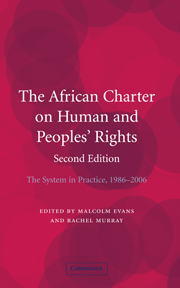Book contents
- Frontmatter
- Contents
- List of contributors
- Table of cases
- List of abbreviations
- Editors' Preface
- Introductory Preface: The African Charter and African Commission on Human and Peoples' Rights
- 1 The African Union and the Regional Human Rights System
- 2 The State Reporting Mechanism of the African Charter
- 3 Communications under the African Charter: Procedure and Admissibility
- 4 Evidence and Fact-Finding by the African Commission
- 5 Civil and Political Rights in the African Charter on Human and Peoples' Rights: Articles 1–7
- 6 Civil and Political Rights in the African Charter: Articles 8–14
- 7 Group Rights
- 8 The Role of Non-governmental Organisations and National Human Rights Institutions at the African Commission
- 9 A View from the Inside: The Role of the Secretariat
- 10 The Special Rapporteurs in the African System
- 11 Working Groups of the African Commission and their Role in the Development of the African Charter on Human and Peoples' Rights
- 12 The Creation of a New African Court of Justice and Human Rights
- 13 Protocol to the African Charter on the Rights of Women in Africa
- Bibliography
- Index
9 - A View from the Inside: The Role of the Secretariat
Published online by Cambridge University Press: 01 July 2009
- Frontmatter
- Contents
- List of contributors
- Table of cases
- List of abbreviations
- Editors' Preface
- Introductory Preface: The African Charter and African Commission on Human and Peoples' Rights
- 1 The African Union and the Regional Human Rights System
- 2 The State Reporting Mechanism of the African Charter
- 3 Communications under the African Charter: Procedure and Admissibility
- 4 Evidence and Fact-Finding by the African Commission
- 5 Civil and Political Rights in the African Charter on Human and Peoples' Rights: Articles 1–7
- 6 Civil and Political Rights in the African Charter: Articles 8–14
- 7 Group Rights
- 8 The Role of Non-governmental Organisations and National Human Rights Institutions at the African Commission
- 9 A View from the Inside: The Role of the Secretariat
- 10 The Special Rapporteurs in the African System
- 11 Working Groups of the African Commission and their Role in the Development of the African Charter on Human and Peoples' Rights
- 12 The Creation of a New African Court of Justice and Human Rights
- 13 Protocol to the African Charter on the Rights of Women in Africa
- Bibliography
- Index
Summary
Introduction
The African Charter on Human and Peoples' Rights (‘the African Charter’ or ‘the Charter’) provides for the establishment of the African Commission on Human and Peoples' Rights (‘the African Commission’ or ‘the Commission’) within the Organisation of African Unity (OAU) (now the African Union (AU)) with the mandate to promote human and peoples' rights and ensure their protection in Africa. A wide range of human rights – namely civil and political, economic, social and cultural, and group rights – are recognised within the African Charter, which also accords them equal importance in terms of recognition, promotion and protection. As such, the African Charter is considered to be one of the most comprehensive human rights treaties currently in existence. The African Commission is the sole supervisory body of the African Charter and will be, until the African Court on Human and Peoples' Rights, established under the Protocol to the African Charter on Human and Peoples' Rights on the Establishment of an African Court on Human and Peoples' Rights, becomes functional. As such, the African Commission is positioned at the very core of the African human rights system.
The African Commission is composed of eleven members who serve on a part-time basis. Therefore, in order for the African Commission to be able to carry out its functions satisfactorily, it is necessary that its members meet, and, as such, provision has been made for members of the African Commission to meet at least twice a year during the ordinary sessions.
- Type
- Chapter
- Information
- The African Charter on Human and Peoples' RightsThe System in Practice 1986–2006, pp. 316 - 343Publisher: Cambridge University PressPrint publication year: 2008



